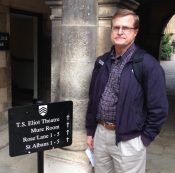By Glynn Young
Like most of us, I read poetry – a lot of poetry – in high school and college English classes primarily because it was assigned. I was much more interested in fiction (Dickens!) and noir mysteries (Dashiell Hammett!) than I was in Tennyson, Wordsworth, Coleridge, and the Elizabethans.
My attitude changed with T.S. Eliot and “The Love Song of J. Alfred Prufrock.” It was first published in 1915, and Poetry Magazine published it only as a favor to Ezra Pound. The editors were so uncomfortable with it that they placed it at the back of the issue. But it was our first great modernist poem, and it changed poetry forever. A high school senior, I read that poem, and I was mesmerized. I went to the local bookstore and bought a small paperback edition of Four Quartets (I still have it; it’s now more than 50 years old).
It was at work as a corporate speechwriter that I discovered the practical advantages of poetry. A friend recommended reading Eliot, Wallace Stevens, and Dylan Thomas, asking me how serious I was in wanting to ratchet my writing up a level. As a result, my writing changed dramatically. I looked at how these poets used language, imagery, rhythm, and cadence, even with free verse. I can look at speeches I wrote before and after I became serious about poetry, and I can see a significant difference for the better.
I learned at least three things.
Poetry made me think differently about language. Language can surprise and intrigue, and poets generally do this better than prose writers. Why do those women in Prufrock come and go, talking of Michelangelo? Why was Eliot trying to say when he repeated those lines throughout the poem?
Poetry helped me see how to highlight dilemmas and decisions. Robert Frost’s deceptively simple “Stopping by Woods on a Snowy Evening” is known to almost every high school student, but it is actually a poem about deciding between alternatives. One makes a difference, but which one?
Poetry showed me how to tell a story differently. Scottish poet Robin Robertson recently wrote The Long Take, a noir novel in the style of Dashiell Hammett and Raymond Chandler but written in free verse form. It’s a stunning work – and a stunning way to tell a story.
If you’re interested in contemporary poetry, here are a few Christian poets (there are others) writing some really good work.
The poetry of Scott Cairns and Nicholas Samaras reflect the Greek Orthodox tradition. Dana Gioia and James Matthew Wilson reflect a Catholic sensibility; Wilson’s recent The Hanging God is a wonder. Mary Harwell Sayler writes wonderful nature poems. Luci Shaw just turned 90, and she is still publishing poetry collections filled with beautiful language. Pat Durmon writes poetry about the people and geography of her native Arkansas. Malcolm Guite, an Anglican priest at Cambridge University, writes wonderful sonnets. And Benjamin Myers has published several collections, most recently Black Sunday which tells the story of the Dust Bowl of the 1930s using the voices of six characters.
Reading any of these poets will be helpful and inspirational for the writing of your fiction.
How poetry is helpful for fiction writing @gyoung9751 #ACFWBlogs #amwriting #pubtip Click To Tweet Glynn Young is a national award-winning speechwriter and communications executive. He’s the author of three published novels, Dancing Priest, A Light Shining, Dancing King, and the newly published Dancing Prophet; and the non-fiction book Poetry at Work. Visit Glynn at Facebook, Twitter, LinkedIn, Pinterest, his blog, the Dancing Priest book page, and his business web site.
Glynn Young is a national award-winning speechwriter and communications executive. He’s the author of three published novels, Dancing Priest, A Light Shining, Dancing King, and the newly published Dancing Prophet; and the non-fiction book Poetry at Work. Visit Glynn at Facebook, Twitter, LinkedIn, Pinterest, his blog, the Dancing Priest book page, and his business web site.

Comments 1
I never thought that poetry
would be a path I’d take,
but the cancer that has taken me
has high-lit that mistake.
The discipline of rhyme and meter,
strict economy of chosen word,
has force-allowed a better, neater
form for what had been scarce heard.
I can now turn and fear the dread
and rising hope that bars the curse,
algorithms of joy for one soon dead
that can only be expressed in verse.
I am not on sight a poetic man,
but silk purses from sows’ ears is God’s plan